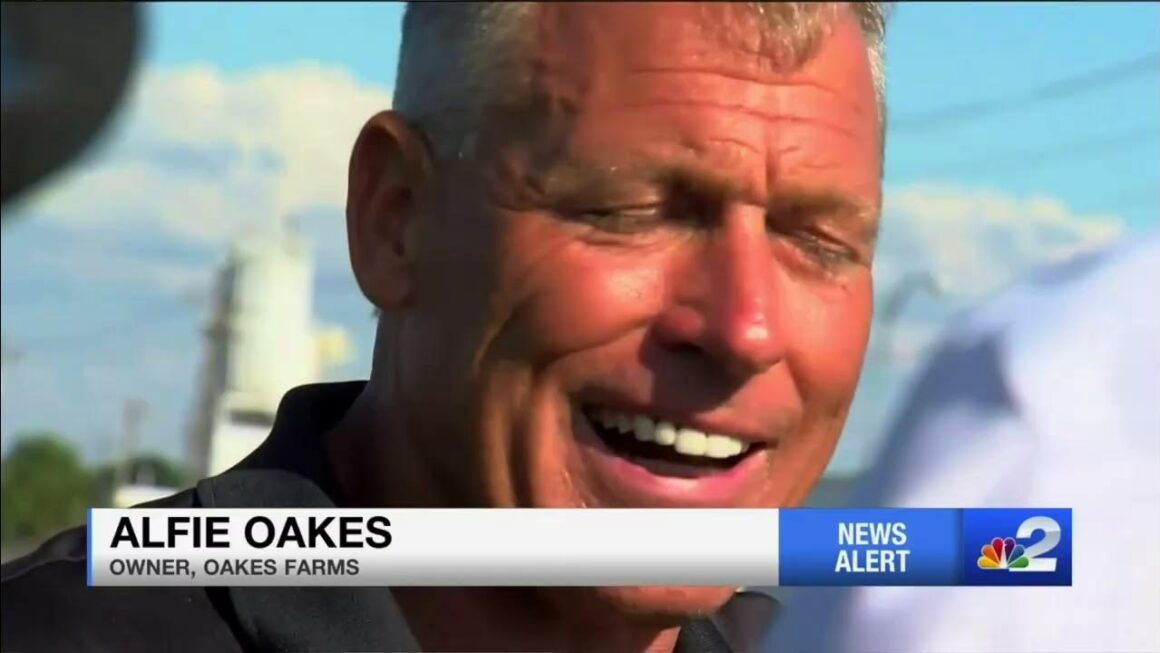In an era when the dominance of corporate farming seems to define the landscape of American agriculture, Alfie Oakes stands as a passionate advocate for local, family-owned farms. As the owner of Oakes Farms, one of Florida’s most prominent agricultural operations, Oakes has built his career around the belief that local, sustainable farming practices can—and should—compete with the corporate giants of the industry. His views on corporate farming versus local agriculture challenge the conventional wisdom that bigger is always better, advocating instead for a more decentralized, community-based approach to food production.
Oakes’ stance on agriculture is rooted in a deep respect for the land and a firm conviction that small-scale, family-run farms have a critical role to play in ensuring a healthy, sustainable food system. Yet, his views on corporate farming are starkly critical, often pointing to the negative impacts that large agribusinesses have on the environment, small farmers, and consumers. For Oakes, the future of agriculture lies not in the hands of mega-corporations but in the hands of local farmers who prioritize quality, sustainability, and community over sheer scale and profit.
The Rise of Corporate Farming and Its Impacts
Corporate farming has become a defining feature of the modern agricultural landscape, with multinational agribusinesses controlling much of the food production in the United States. These companies prioritize efficiency and profitability, often at the expense of environmental sustainability, worker welfare, and the quality of the food they produce. Large-scale operations use advanced technology, synthetic fertilizers, and pesticides to maximize yields, relying on monoculture farming practices to produce vast quantities of a single crop.
Oakes argues that this system of industrial agriculture has led to the degradation of both the land and local farming communities. In many cases, corporate farms deplete soil health, contribute to water pollution, and rely heavily on chemical inputs that harm both the environment and public health. Additionally, corporate farming often forces small farmers out of business due to the sheer scale and financial resources of larger companies, which can flood the market with cheap, mass-produced products that undercut local prices.
One of Oakes’ primary concerns with corporate farming is its focus on profits over people. He believes that corporate entities place far too much emphasis on maximizing yields and minimizing costs, often to the detriment of the environment and the communities that depend on farming for their livelihoods. To Oakes, corporate farms are more concerned with the bottom line than with growing healthy food in harmony with nature.
The Case for Local Agriculture
In contrast to corporate farming, Oakes champions local agriculture as a way to restore balance to the food system. By supporting smaller, family-owned farms, Oakes believes that communities can build more resilient, sustainable food systems that prioritize environmental health, food quality, and local economies. Unlike the industrial model, local agriculture tends to focus on biodiversity, crop rotation, and sustainable practices that work with the land instead of exploiting it.
Oakes Farms is a prime example of this approach. Rather than using harmful chemicals and large-scale industrial methods, Oakes embraces organic farming practices that improve soil health, promote biodiversity, and reduce the farm’s carbon footprint. He also works to reduce food waste by growing a variety of crops and selling them directly to local consumers through Oakes Farms Market. This direct-to-consumer model not only allows Oakes to ensure that his customers receive the freshest, highest-quality products but also helps to build a stronger connection between farmers and the communities they serve.
In Oakes’ view, local agriculture isn’t just about farming methods—it’s about creating a local food economy that is more resilient and independent from the global corporate food system. By supporting family-owned farms, consumers can help ensure that money stays within the community, creating jobs and bolstering local economies. This approach also helps reduce the environmental impact of food production by cutting down on transportation and packaging, making it a more sustainable alternative to the industrial food system.
Sustainability Over Scale
One of the core principles of Oakes’ philosophy is sustainability—both environmental and economic. While corporate farming often emphasizes scale and efficiency, Oakes believes that small, local farms can be just as productive, if not more so, when they prioritize sustainability over sheer output. His farm relies on regenerative practices that nurture the soil, reduce water usage, and minimize chemical inputs. These methods, Oakes argues, are not only better for the environment, but also for the long-term health of the farm itself.
Oakes is quick to point out that sustainability doesn’t just mean reducing environmental harm—it’s about creating systems that can endure over time. Unlike corporate farming, which may exhaust the land or create environmental damage in pursuit of short-term profits, local agriculture focuses on creating long-term value by fostering healthy ecosystems and building a strong relationship between the farm and its community.
In addition to environmental sustainability, Oakes also emphasizes the importance of economic sustainability for small farmers. Corporate farming, with its enormous financial resources, can afford to drive down prices and outcompete small farms in the marketplace. Local farms, on the other hand, often struggle to compete with the cheap, mass-produced goods of agribusiness. Oakes believes that in order to survive, small farmers must adopt a model that emphasizes direct sales to consumers, reducing reliance on traditional distribution networks that often favor large corporations.
Quality Over Quantity
Another major difference between corporate farming and local agriculture, according to Oakes, is the focus on food quality. Large-scale farms often prioritize quantity over quality, using chemical fertilizers and pesticides to increase crop yields at the expense of flavor, nutrition, and safety. Oakes, however, believes that local farmers can produce food that is not only more nutritious and flavorful but also safer for consumers. By focusing on organic practices and growing a variety of crops, small farms can produce a diverse range of foods that meet the unique needs and preferences of local communities.
For Oakes, food is not just a commodity—it’s a reflection of the values of the farm that produces it. He argues that local farms, which are often more connected to their communities, have a greater responsibility to provide high-quality, nutritious food that benefits both consumers and the environment. This focus on quality over quantity is one of the main reasons why Oakes has remained steadfast in his commitment to organic and sustainable farming practices.
A Call for Policy Change
While Oakes believes in the power of local agriculture to reshape the food system, he also recognizes that policies play a crucial role in determining the future of farming. He has been outspoken in his criticism of government regulations that, in his view, favor large agribusinesses over small farmers. Oakes argues that many of the regulations governing food safety and farming practices disproportionately burden family-run farms, making it harder for them to compete with the scale and resources of corporate operations.
For Oakes, advocating for food freedom and deregulation is essential to leveling the playing field for small farmers. He believes that consumers should have the right to choose where their food comes from and how it is produced, without excessive government interference. This philosophy is particularly evident in his advocacy for raw milk sales and other farm-to-consumer practices that have been restricted by state and federal regulations.
The Future of Agriculture: A Balanced Approach
Alfie Oakes’ vision for the future of agriculture is one that balances the benefits of local, sustainable farming with the need for efficient and accessible food production. While he remains critical of corporate farming’s environmental and social impacts, he also acknowledges that there is room for innovation and progress within the agricultural industry.
Ultimately, Oakes believes that the future of farming lies in creating a food system that is more decentralized, sustainable, and focused on the needs of local communities. By supporting local agriculture and pushing for policy reforms that benefit small farmers, Oakes hopes to inspire a return to farming practices that prioritize quality, sustainability, and connection to the land. In this vision, small, family-owned farms can not only survive but thrive, offering a viable and vibrant alternative to the corporate food system that dominates much of today’s agricultural industry.



